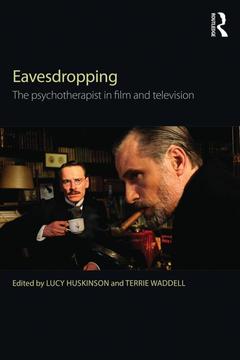Eavesdropping The psychotherapist in film and television
Coordonnateurs : Huskinson Lucy, Waddell Terrie

What can depictions of psychotherapy on screen teach us about ourselves?
In Eavesdropping, a selection of contributions from internationally-based film consultants, practicing psychotherapists and interdisciplinary scholars investigate the curious dynamics that occur when films and television programmes attempt to portray the psychotherapist, and the complexities of psychotherapy, for popular audiences.
The book evaluates the potential mismatch between the onscreen psychotherapist, whose raison d?être is to entertain and engage global audiences, and the professional, real-life counterpart, who becomes intimately involved with the dramas of their patients. While several contributors conclude that actual psychotherapy, and the way psychotherapists and their clients grapple with notions of fantasy and reality, would make a rather poor show, Eavesdropping demonstrates the importance of psychotherapy and psychotherapists on-screen in assisting us to wrestle with the discomfort ? and humour - of our lives.
Offering a unique insight into perceptions of psychotherapy, Eavesdropping will be essential and insightful reading for analytical psychologists, psychoanalysts, academics and students of depth psychology, film and television studies, media studies and literature, as well as filmmakers.
Acknowledgements. Introduction. Part I: Erotic Transference 1.Andrea Sabbadini, The (Mis)representation of Psychoanalysis in Film 2. Lucy Huskinson, Challenging Freud on the Realities of Erotic Transference with Fictional Case Study: The Sopranos (1999-2007) and In Treatment (2008-2010) 3. Elisabeth Hanscombe, The Real Psychotherapist: An Impossibility for Film Part II: The Psychoanalytic Approach 4. Barbara Creed, Equus: Ecstasy, Therapy and the Animal 5. Mark Nicholls, A Conversation Between Enlightened Friends: The Mutual Reassurances of the Arts and sciences in Freud (BBC TV, 1984 6. Dinesh Bhugra and Gurvinder Kalra, Applying Psychoanalysis to Hindi Cinema) 7. Patricia Gherovici and Jamieson Webster, The Bad Psychoanalyst: Watching the Success of Failure Part III: A Contest of Wills 8. Terrie Waddell, Shrink Wrapped Television: Simulated Therapy, Disclosure, and the Lure of Plausible Doubt 9. Helena Bassil-Morozow, Crossing the River Styx in a Small Boat 10. Donald Fredericksen, Remarks on the Functions of the Psychiatrist in Hitchcock’s Psycho and Bergman’s Persona 11. Irene Oestrich, Romance or Psychotherapy? Screen References. Notes on Contributors. Index.
Lucy Huskinson, PhD, is a senior lecturer in the School of Philosophy and Religion at Bangor University, UK. She is coeditor in chief of the International Journal of Jungian Studies and author and editor of numerous books and articles, including Dreaming the Myth Onwards: New Interpretations of Jungian Therapy and Thought (Routledge, 2009).
Terrie Waddell, PhD, is associate professor of Media: Screen and Sound at La Trobe University, Australia. She researches and publishes on the relationships among screen media, myth, literature, gender, popular culture, and analytical psychology. Wild/lives: Trickster, Place and Liminality on Screen (Routledge, 2010) is her most recent monograph.
Date de parution : 12-2014
15.6x23.4 cm
Disponible chez l'éditeur (délai d'approvisionnement : 14 jours).
Prix indicatif 50,12 €
Ajouter au panierDate de parution : 12-2014
15.6x23.4 cm
Disponible chez l'éditeur (délai d'approvisionnement : 14 jours).
Prix indicatif 214,69 €
Ajouter au panierThème d’Eavesdropping :
Mots-clés :
Young Man; film; Patient's Erotic Feelings; television; Habemus Papam; psychotherapist; Sabina Spielrein; representations; Human Suffering; psychotherapy; Son’s Room; cinema; Ernst Von Fleischl; screen; Erotic Transference; Terrie Waddell; Hindi Cinema; Andrea Sabbadini; Bergman's Persona; Elisabeth Hanscombe; Plausible Doubt; Barbara Creed; Boundary Violator; Mark Nicholls; Psychiatrist’s Explanation; Dinesh Bhugra; American Talk Show; Gurvinder Kalra; Von Trier; Patricia Gherovici; Erotic Countertransference; Jamieson Webster; Downloading Child Pornography; Helena Bassil-Morozow; Young Homosexual Woman; Donald Fredericksen; Von Fleischl; Irene Oestrich; Shrink Rap; Counter Transference; Art Cinema Narration; Enlightened Friends; David Suchet; Transference Love



